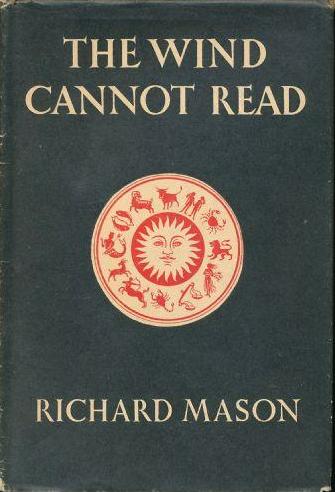
|
1948 Reprint Society hardcover (UK)
Copped and cropped from Abebook.com
|
|
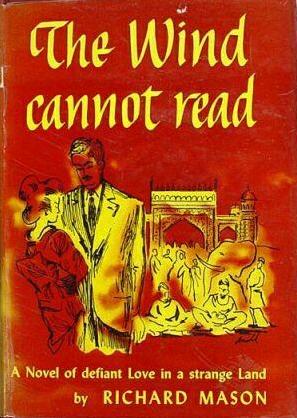
|
|
1957 Putnam hardcover (US)
|
|
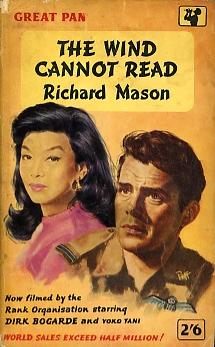
|
1958 Pan Books paperback
Film tie-in cover
|
|
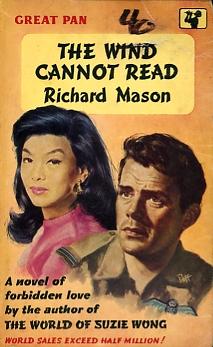
|
1960 Pan Books paperback
Suzie Wong tie-in cover
|
|
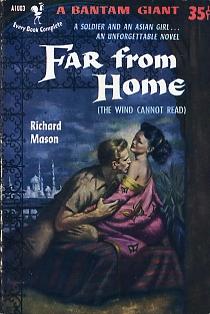
|
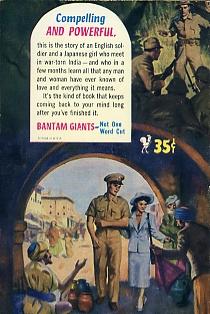
|
Far From Home
(The Wind Cannot Read)
1952 Bantam Books paperback
|
|
Richard Mason
The Wind Cannot Read
Hardcover editions
London: Hodder & Stoughton, 1947 (December 1946)
London: The Reprint Society, 1948 (Book club)
296 pages, hardcover
New York: Putnam, 1947
296 pages, hardcover
Paperback editions
London: Pan Books, 1952
256 pages, paperback (206)
London: Pan Books, 1958 (2nd printing)
271 pages, paperback (G119)
Cover: "Now filmed by the
Rank Organisation starring
DIRK BOGARDE and Yoko Tani"
[Cover illustration shows drawings of
Bogarde and Tani as Quinn and Sabbi]
London: Pan Books, 1958 (6th printing)
271 pages, paperback (G119)
Cover: "A novel of forbidden love
by the author of
THE WORLD OF SUZIE WONG
[Cover illustration shows drawings of
Bogarde and Tani as Quinn and Sabbi]
Far from Home
(The Wind Cannot Read)
New York: Bantam Books, 1952
308 pages, paperback (A1003)
Poetic title
The title page quotes the poem from which the title is taken.
"Though on the sign it is written:
'Don't pluck these blossoms' --
it is useless against the wind,
which cannot read."
-- JAPANESE POEM
The poem is also cited on the top of the back cover, under the banner FORBIDDEN!. The poem is followed by this summary of the plot. .
MICHAEL QUINN, RAF, plucks the forbidden blossom when on an Intelligence course in India he and his Japanese girl-instructor fall passionately in love.
Their brief happiness is interrupted when, sent to the Burma front, he is captured by the Japanese.
He escapes -- but returns to find Fate waiting.
From jungle to language school
Quinn has had to retreat with the unit he had been stationed with in Burma when Japanese forces invade the country. Months later he makes it through the jungle to India -- exhausted, weak with dysentery, and full of thoughts of those who had been left behind with a few rounds of ammunition "to use as they like on the Japs and themselves" (page 5).
After being officially grounded by a medical board in New Delhi, he is sent to Bombay to study Japanese so he can interrogate prisoners. The hotel where he and others in his group will be staying is run by a woman called Miss Jackson (page 20).
She was an Anglo-Indian, thirty-five perhaps, with Jewishly handsome features that showed signs of softening and running to seed; but there was a ripe attraction about her still.
The men are given a test. Characters are written on the board and quickly erased. Other characters are written on the board with numbers. Write the numbers of the characters in the second set that were also in the first set.
Quinn doesn't do too well, but he says he has ears than eyes, so he is put in the half of the class that will focus on speaking, while others will concentrate on reading.
Itsumi San's thin skin
Their chief instructor is a Brigadier general who is fluent in Japanese. He is assisted by several Japanese instructors. One of the assistants is a man named Mr. Itsumi -- "or Itsumi San as we called him, for San was the Japanese equivalent to Mr." (pages 28-29).
He was only twenty-nine or thirty, with an owlish student's face. He had been studying British business methods in England, and on the way back to Japan when the war started, his ship had docked in India. He had been released from internment to teach us.
He was strikingly yellow. I had not met many Japanese, and I did not know that they were really this colour, a deep brown-yellow. When he was angry it turned to a grey-yellow, and that happened often, for he easily took offence. I suppose it was an inferiority complex. He would misunderstand a word, and believing himself to be insulted would fall suddenly silent and nurse a grudge for days.
Miss Wei's shyness
Another assistant instructor is a woman named Miss Wei. One day she comes into the classroom with the Brigadier (pages 31-32).
Of course the Brigadier had told us before: "Wei is a Chinese name. She is using it because it is not advisable to have a Japanese name now. But Miss Wei is Japanese -- you will find she speaks the best Tokyo language." That is all he had told us. We had waited expectantly; most of us had never seen a Japanese woman before.
We were all silent, watching her. She stood nervously by the Brigadier, looking at the corner of the desk, very slim and tiny in a light summer frock.
"I will introduce you," the Brigadier said. "This is Miss Wei."
We murmured, "Good morning."
"Good morning," she said with her lips, and gave a quick little stoop, a suggestion of a curtsy.
"Miss Wei has come all the way from England to help us out." He smiled at her gallantly and gratefully. She smiled too, dropping her eyelids in self-depreciation. Then she sat down next to him behind the desk.
There were general signs of approval: Miss Wei had passed the first test -- she was pretty. She was a spot of fresh colour in the schoolroom, with its blackboard and its piles of books and its tables and its inkpots. For a time nobody looked out the window, and there was a certain amount of winking.
"She is exquisite!" Peter whispered.
"Yes," I said.
"We are going to have delightful classes."
"We probably will."
"Once she has got over her shyness," he added.
It was not surprising that she was shy when there were ten of us there, ten strange faces ranged in front of her. Ten of us judging her critically as a woman.
Mason is very good at evoking mood. The characters of the officers that figure in the story are all carefully and well developed. If Itsumi San represents the sort of Japanese that the officers find difficult to like (though they cannot quite hate him either), Miss Wei tests their ability to regard as as something other than Japanese -- as a woman if not a exactly a person.
Within a few pages Quinn is getting to know more about Miss Wei after class. His friends kid him about Miss Wei but he insists he is not chasing the Japanese lady (page 48).
Indian and English women
One Saturday Quinn and two classmates go to the races. Mario wants to see "beautiful women in smart clothes, women who would remind him of European capitals." Peter "wanted to make money" and had a system. And Quinn himself was going because "he had no system for anything and could think of nothing better to do."
The racecourse is crowded, the grandstand is full of Maharajahs, and the men are in a paddock thanks to badges they'd been given by the Brigadier (page 49).
Isn't it simply marvellous," Mario said. "I love to be amongst the best people."
"It's excellent," Peter said. "You see, the Indians have best people too. I'd got it all wrong. I thought all Indians were babus and sweepers."
There was plenty of colour for Mario. All the Indian women were wearing their silk saris, very soft and colourful, and wholly feminine; the English women moved amongst them like a different sex, half-way to masculinity. These Indians seemed to glide as they moved, and the diaphanous material, exquisitely bordered in silver or gold, floated behind them; they stood in twos and threes like bunches of soft-petalled flowers. Mario was smiling his white Latin smile with aesthetic delight.
Sabby and Michael
A number of pages later Quinn and Miss Wei get down to the serious business of naming each other (page 67).
When you laugh you're very happy. But there is also part of you that's sabishii."
"I don't see how you know."
"It's because you have expressive eyes."
"I shall wear spectacles, and then I shall become real schoolmistress. I shall use stick."
"You'll still feel the same," I said.
But you will not know how I feel behind the spectacles."
"Do you mind my knowing?"
"Not if you don't care about sabishii."
"I think it's very beautiful and soulful," I said. "I'm going to call you sabishii. Only it had better be Sabby for short. Sabby! That's rather a good name -- perhaps better than your real name."
"My real name is Hanako."
"The Flower Child! That's a good name, too. But I'm going to call you Sabby."
"I already know what you are called," she said.
"Quinn is such an easy name to remember."
But I also know your other name, because your friend always uses it as school. It is Michael."
The tension in this novel builds to an incredible height. The tragic ending does little to relieve it, making it unlikely that anyone who has read this novel will forget it. Mason's ability to pull this off testifies to his skill as a writer.
And Two Shall Meet
Reminiscent of the manner in which Hanako hides her illness from Quinn, both Lilly and Richard, the star-crossed lovers in Raymond Mason's And Two Shall Meet (1954), hide their mortal conditions from each other.
Mason on writing "The Wind Cannot Read"
Richard Mason (1919-1997) was 19 when World War II began. Later in the war, he says, he was sent to "a school of oriental studies in London to learn Japanese to go out to the East and act as an interpreter and to interrogate Japanese prisoners of war" (Guy Haydon, "About the Author", in Suzie Wong, Hong Kong: Pegasus, 1994).
Mason says he wrote The Wind Cannot Read when he was 23, while living in a tent in Burma, on a portable typewriter.
The movie
Hal Erikson's "All Movie Guide" includes this summary of the 1958 British film starring Dirk Bogarde as Quinn and Yoko Tani as Sabby.
The Wind Cannot Read
1958-UK-War Drama
N.Y. Times Review
PLOT DESCRIPTION
The Wind Cannot Read is a tearful British star crossed romance effort set against the backdrop of World War II. RAF officer Dirk Bogarde is assigned to learn Japanese in order to interrogate prisoners. His language instructor is the lovely Yoko Tani, daughter of an anti-Tojo businessman. Bogarde and Tani fall in love and secretly marry. Not long afterward, Borgarde [sic] is captured and tortured by the Japanese. While listening to the POW camp radio loudspeaker, he hears the voice of Tani, broadcasting anti-British propaganda. At first heartbroken, Bogarde vows to be reunited with Tani when he discovers that she is dying from brain disease. Escaping from the camp, Bogarde finally makes his way to the hospitalized Tani, where they share a tender moment before death enshrouds her. Richard Mason based his script for The Wind Cannot Read on his own novel.
-- Hal Erickson, All Movie Guide
|





